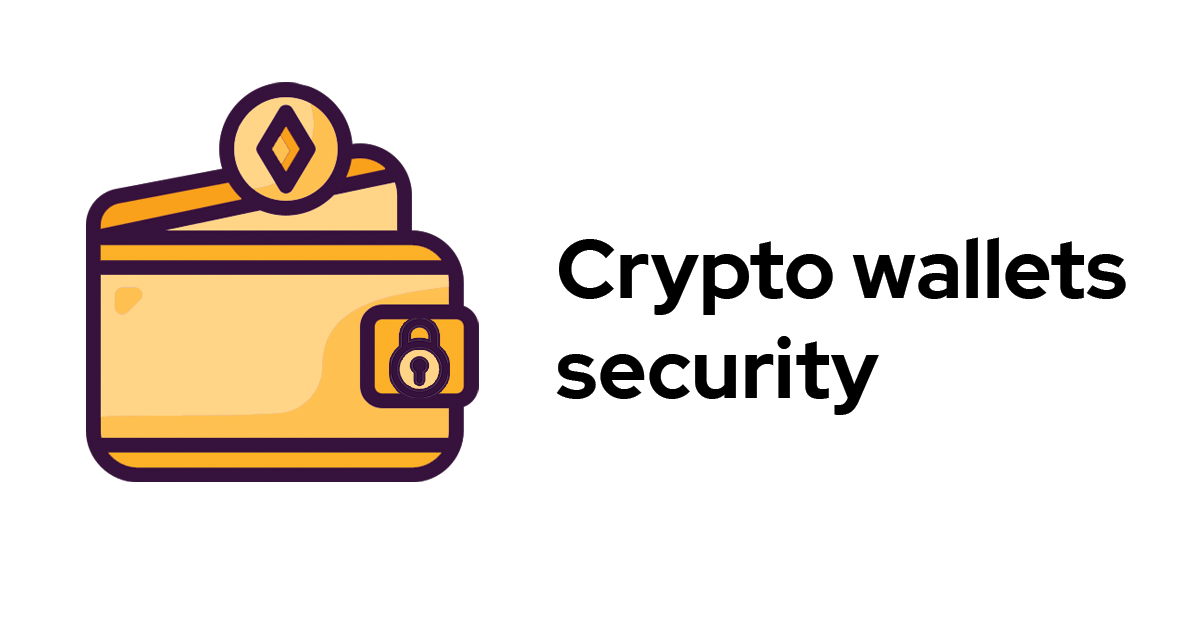Crypto Wallet Security Best Practices - Safeguarding Your Digital Assets
Safeguard crypto assets with best crypto wallet security best practices. Explore wallet security measures for a fortified digital fortress.
Author:Camilo WoodReviewer:Stefano MclaughlinFeb 02, 20242.4K Shares56K Views

Cryptocurrency wallets serve as the gateway to managing and securing digital assets. As the popularity of cryptocurrencies continues to rise, so does the importance of implementing robust security measures for these wallets. This article explores essential crypto wallet security best practices, helping users navigate the evolving landscape of threats and vulnerabilities.
A cryptocurrency wallet's attack surface is large, and many of its weaknesses and possible problems are found where several defects that could affect design, security, cryptography, access, authentication, and storage come together.
The most crucial component of the infrastructure of any cryptocurrency application or platform is wallet security and private key storage. Mishandling your private keys is like giving your safety deposit box keys to a rogue individual.
While none of them by themselves would be problematic, when combined, the attack surface might grow. Public blockchains lack customer assistance, anti-fraud measures, and the capacity to reverse transactions in the case that funds are compromised, in contrast to banks and certain more centralized cryptocurrency businesses.
Choose A Secure Wallet Type
The first step in ensuring crypto wallet security is selecting the right type of wallet. Wallets generally fall into two categories: hot wallets (connected to the internet) and cold wallets (offline). Hot wallets, such as online wallets and mobile wallets, offer convenience but are more susceptible to hacking. Cold wallets, including hardware wallets and paper wallets, provide enhanced security as they are offline and less vulnerable to online threats.
Use Reputable Wallet Providers
Selecting a reputable wallet provider is crucial for security. Stick to well-established and reputable wallet providers with a history of security measures and positive user reviews. Be cautious of newly launched wallets or those with limited information and reviews, as they may pose higher risks.
Implement Strong Passwords
Creating a strong and unique password is fundamental to crypto wallet security. Avoid using easily guessable passwords. For your wallet accounts, come up with a strong and distinctive password by combining capital and lowercase characters, numbers, and symbols. Steer clear of popular passwords and information that can be easily guessed.
Enable Two-Factor Authentication (2FA)
Enabling two-factor authentication adds an extra layer of security to your crypto wallet. Utilize 2FA options such as authentication apps or hardware keys to protect your account from unauthorized access. This additional step significantly enhances the security of your wallet, even if your password is compromised.
Keep Software And Firmware Updated
Regularly updating wallet software and firmware is crucial for staying ahead of potential vulnerabilities. Wallet providers often release updates to address security issues and enhance overall performance. Keep abreast of these updates and promptly apply them to ensure your wallet remains secure against evolving threats.
Backup Your Wallet
Backup your wallet regularly to prevent the loss of funds in case of device failure, loss, or theft. Follow the recommended backup procedures provided by your wallet provider, which may include mnemonic phrases, seed phrases, or encrypted backups. Store backups in secure locations, such as offline storage or encrypted cloud services, and avoid sharing them with unauthorized individuals.
Employ A Virtual Private Network (VPN)
When accessing your wallet accounts, especially on public or unprotected Wi-Fi networks, use a VPN to create a private and encrypted connection.
Use Caution When Clicking On Links
Phishing attempts and dubious websites or emails that might try to fool you into disclosing your wallet credentials should be avoided. Check websites for legitimacy and make sure the URLs are correct before entering any important data.
Secure Physical Storage
For hardware wallets, which are physical devices, secure storage is essential. Keep hardware wallets in a safe place, such as a physical safe or a secure location in your home. Ensure that only trusted individuals have access to the physical device to prevent unauthorized tampering or theft.
Be Cautious Of Phishing Attacks
Phishing attacks are prevalent in the crypto space, with scammers attempting to trick users into revealing sensitive information. Be cautious of unsolicited emails, messages, or links requesting wallet details or personal information. Always verify the legitimacy of communications and use official channels to access your wallet.
Educate Yourself On Social Engineering Tactics
Social engineering tactics involve manipulating individuals into divulging confidential information. Familiarize yourself with common social engineering strategies, such as impersonation, and be skeptical of unsolicited communication, even if it appears to be from a trusted source.
Utilize Secure Networks
Avoid accessing your crypto wallet on public or unsecured Wi-Fi networks. Public networks may expose your wallet to potential security threats. Whenever possible, use a secure and private network to conduct transactions and manage your digital assets.
Practice Wallet Hygiene
Regularly review your wallet activity and transaction history. Remove any unused or unnecessary wallets and addresses. Consider consolidating funds into a single, well-secured wallet to simplify management and reduce the potential attack surface.
Understand And Use Multisignature Wallets
Multisignature (multisig) wallets require multiple private keys to authorize a transaction. Consider using multisig wallets for an added layer of security, especially for significant holdings. This approach ensures that compromised access to one key does not grant unauthorized control over the wallet.
Keep Private Keys Offline
Private keys are the cryptographic keys that grant access to your funds. Store private keys in an offline and secure environment, such as a hardware wallet or a paper wallet. Avoid storing private keys on devices connected to the internet to minimize the risk of unauthorized access.
Test Transactions With Small Amounts
When testing new wallet features or conducting transactions with unfamiliar addresses, start with small amounts. This precautionary measure allows you to verify the accuracy of the transaction and ensures that there are no unforeseen issues before transferring larger sums.
Stay Informed About Security Threats
The crypto landscape is dynamic, with new security threats emerging regularly. Stay informed about the latest security vulnerabilities, scams, and best practices by following reputable sources, forums, and updates from wallet providers. Being proactive and informed is key to navigating the ever-evolving security challenges in the cryptocurrency space.
Crypto Wallet Security Best Practices - FAQs
Which Of The Following Is The Most Security Type Of Crypto Wallet?
The safest kind of cryptocurrency wallet is usually thought to be a hardware wallet. Since these wallets may be kept offline, they are safe from malware and hackers.
How Do I Make My Crypto Wallet Secure?
- Pick a software wallet application. The first step in setting up a software cryptocurrency wallet is to choose a trustworthy wallet supplier.
- Install the wallet app on your PC or phone.
- Register for an account.
- Give your possessions away.
How Can I Ensure The Physical Security Of My Hardware Wallet?
Secure hardware wallets by storing them in a safe place, restricting access, and avoiding exposure to potential tampering or theft.
Why Is Two-factor Authentication Important For Crypto Wallet Security?
Two-factor authentication adds an extra layer of security, requiring an additional step beyond a password for account access.
Why Is It Important To Keep Wallet Software And Firmware Updated?
Regular updates address security vulnerabilities, enhance overall performance, and ensure wallets remain secure against evolving threats.
What Are Multisignature Wallets, And How Do They Enhance Security?
Multisignature wallets require multiple private keys to authorize transactions, adding an extra layer of security, especially for significant holdings.
Can Crypto Wallets Be Hacked?
Yes, hackers can gain access to cryptocurrency wallets through a variety of means, and ransomware can even lock them.
Conclusion
Ensuring the security of your crypto wallet is a continuous and evolving process. By adopting these best crypto wallet security best practices, users can significantly enhance the protection of their digital assets. From selecting the right wallet type to implementing strong passwords, staying vigilant against phishing attacks, and staying informed about the latest threats, incorporating these practices into your routine will contribute to a safer and more secure crypto wallet experience.
Jump to
Choose A Secure Wallet Type
Use Reputable Wallet Providers
Implement Strong Passwords
Enable Two-Factor Authentication (2FA)
Keep Software And Firmware Updated
Backup Your Wallet
Employ A Virtual Private Network (VPN)
Use Caution When Clicking On Links
Secure Physical Storage
Be Cautious Of Phishing Attacks
Educate Yourself On Social Engineering Tactics
Utilize Secure Networks
Practice Wallet Hygiene
Understand And Use Multisignature Wallets
Keep Private Keys Offline
Test Transactions With Small Amounts
Stay Informed About Security Threats
Crypto Wallet Security Best Practices - FAQs
Conclusion

Camilo Wood
Author

Stefano Mclaughlin
Reviewer
Latest Articles
Popular Articles

